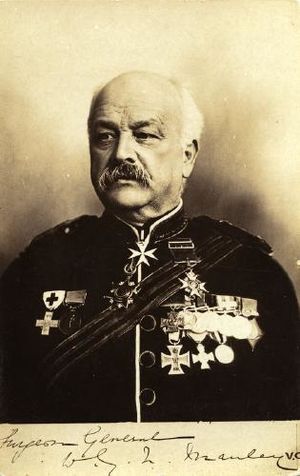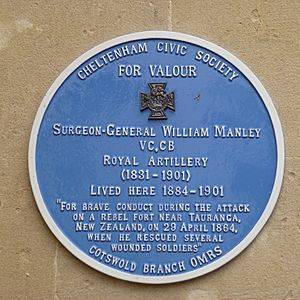William Manley facts for kids
Quick facts for kids
William Manley
|
|
|---|---|
 |
|
| Born | 17 December 1831 Dublin, Ireland |
| Died | 16 November 1901 (aged 69) Cheltenham, Gloucestershire, England |
| Allegiance | United Kingdom |
| Service/ |
British Army |
| Rank | Surgeon General |
| Unit | Royal Regiment of Artillery Royal Army Medical Corps |
| Battles/wars | Crimean War New Zealand Wars Franco-Prussian War Second Anglo-Afghan War Anglo-Egyptian War |
| Awards | Victoria Cross Companion of the Order of the Bath Iron Cross, 2nd Class (Prussia) |
Surgeon General William George Nicholas Manley (17 December 1831 – 16 November 1901) was a brave officer and doctor in the British Army. He received the Victoria Cross (VC), which is the highest award for courage in battle given to British and Commonwealth soldiers. He was also given awards from other countries. He is the only person to have received both the VC and the Iron Cross, a famous German medal.
Contents
Early Life
William Manley was born in Dublin, Ireland, on December 17, 1831. His father was a reverend, and his mother's father was a doctor in the army. William went to school at Blackheath Proprietary School. In 1851, he became a member of the Royal College of Surgeons of England, which meant he was a qualified surgeon.
Military Career
In 1854, William Manley joined the army as a doctor. He worked with the Royal Regiment of Artillery during the Crimean War. He was present during the Siege of Sevastopol. Later, his regiment was sent to New Zealand.
His Victoria Cross Award
When he was 32 years old, William Manley was an assistant surgeon during the Waikato-Hauhau Maori War in New Zealand. On April 29, 1864, near Tauranga, he showed amazing bravery during an attack on a rebel pā (a fortified Māori village) called Gate Pā. This is why he received the Victoria Cross:
He risked his own life to save others during the attack on the rebel village near Tauranga. He had volunteered to go with the soldiers into the village. When Commander Hay of the Royal Navy was badly wounded, Manley stayed with him. Then, he bravely volunteered to go back into the village to look for more wounded soldiers. He was one of the last officers to leave the village.
He also served in other battles in New Zealand and was praised for his actions. Because of his excellent service, he was promoted to staff surgeon.
Later Service
In 1870, when the Franco-Prussian War started, William Manley joined the British Ambulance Corps. He worked with the Prussian Army, helping wounded soldiers. He was at several battles and received the Iron Cross (second class) from the German Crown Prince. This award was for his work caring for wounded soldiers during battles in December 1870.
Later, in 1878-1879, he served in the Second Anglo-Afghan War. In 1882, he was in Egypt for the Anglo-Egyptian War. He was the main medical officer for a division of soldiers and was present at the Battle of Tel el-Kebir. After this war, he was promoted again to Deputy Surgeon-General.
Later Life and Retirement
William Manley was given the special title of Surgeon General. He retired from the army in 1884 and received a special pension for his distinguished service. After retiring, he was made a Knight of the Venerable Order of Saint John of Jerusalem and a Companion of the Order of the Bath. He passed away in Cheltenham, Gloucestershire, on November 16, 1901.
Family
William Manley married Miss M. E. Darton. They had one daughter and five sons. Sadly, one of his sons, Lieutenant G. E. D. Manley, died while serving in China shortly before his father passed away.
Awards and Honours
William Manley received 18 medals from different countries. He is famous for being the only person to receive both the Victoria Cross (from the United Kingdom) and the Iron Cross (from Prussia, which later became part of Germany).
Here are some of his important awards:
| Ribbon | Description | Notes |
| Crimea Medal | ||
| Victoria Cross (VC) | ||
| Afghanistan Medal | ||
| Egypt Medal | ||
| Order of the Bath | ||
| Order of St John | ||
| Iron Cross | ||
| War Commemorative Medal of 1870/71 | ||
| Military Merit Order (Bavaria) | ||
| Order of Osmanieh | ||
| Khedive's Star |
While in New Zealand, he also received a bronze medal from the Royal Humane Society. This was for saving a man from drowning. After the siege of Paris, he received the Cross of the Société française de secours aux blessés militaires (French Red Cross Society).
| Ribbon | Description | Notes |
| Royal Humane Society | ||
| Société française de secours aux blessés militaires |
His medals are now on display at the medals gallery of Firepower - The Royal Artillery Museum in Woolwich, London.
 | Laphonza Butler |
 | Daisy Bates |
 | Elizabeth Piper Ensley |


